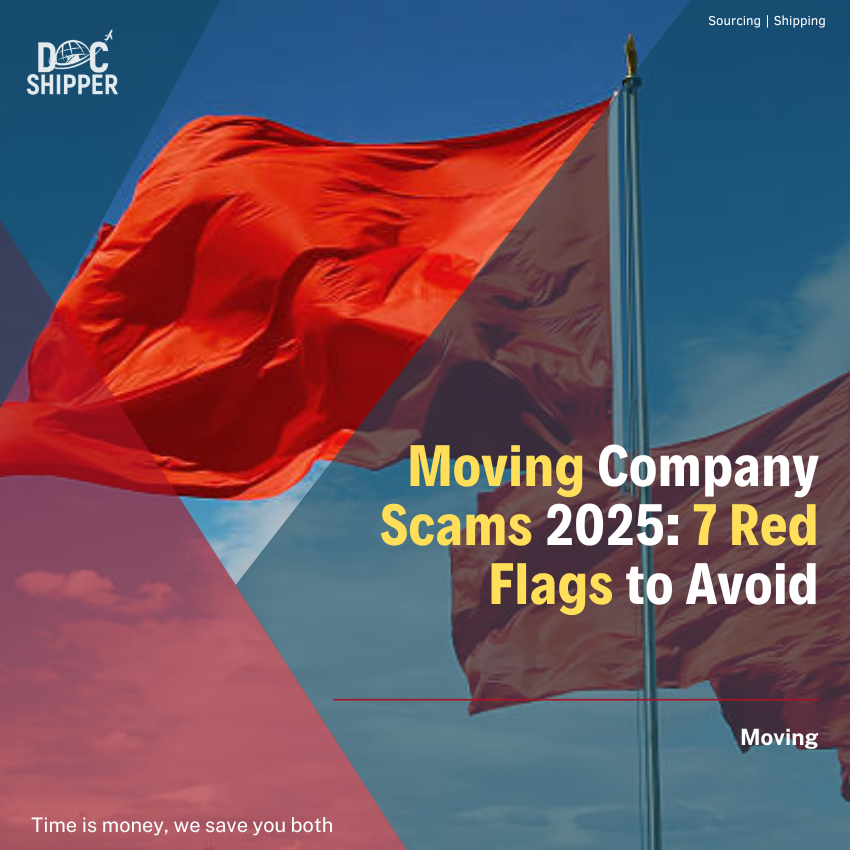Introduction
Moving company scams have reached alarming heights in 2025, with fraudulent movers targeting unsuspecting families during one of life's most stressful transitions. Recent industry data reveals that moving fraud cases have increased by 35% since 2024, with victims losing an average of $2,800 per incident. These bogus movers exploit the vulnerability of customers who need reliable moving services, turning what should be a fresh start into a financial nightmare.
The impact of moving company fraud extends beyond monetary losses. Families have lost irreplaceable belongings, faced delayed relocations, and endured emotional distress during critical life transitions. With the moving industry projected to grow by 12% in 2025, illegitimate moving companies are multiplying rapidly, making it crucial to identify moving scam red flags before they strike.
DocShipper stands as your trusted partner in this challenging landscape, offering verified, fully licensed moving services with transparent pricing and comprehensive protection. Our expertise in logistics and moving fraud prevention ensures your belongings reach their destination safely while protecting you from rogue moving companies.
Summary
The 7 Critical Red Flags of Moving Company Scams in 2025
Red Flag #1 - Unusually Low Estimates and Bait-and-Switch Pricing
The "lowball estimate" remains the most common tactic used by fake moving companies in 2025. These scammers deliberately provide estimates 40-60% below market rate to secure your business, only to dramatically increase costs on moving day when your belongings are already loaded on their truck.
Legitimate moving companies provide detailed estimates based on actual inventory assessments. Suspicious pricing indicators include quotes significantly below competitors, estimates given without viewing your belongings, or verbal quotes without written documentation. According to FMCSA consumer protection guidelines, reputable movers conduct thorough assessments before providing binding estimates.
DocShipper Advice :When a moving company offers a single fixed price for your entire relocation, it's often a red flag. Every move is unique, that’s why we offer three pricing tiers adapted to your needs and level of involvement, from budget-friendly to fully managed relocations. Each plan comes with a detailed service description. Interested in our plans, get a free quote today.
Red Flag #2 - Demanding Large Cash Deposits Upfront
Legitimate moving companies typically request minimal deposits, usually 10-20% of the total estimate, and accept multiple payment methods. Moving company scams often demand substantial cash payments upfront, sometimes 50% or more of the quoted price. This moving deposit scam serves two purposes: securing immediate payment before disappearing and making it harder for victims to dispute charges.
Secure payment methods include credit cards, certified checks, or electronic transfers that provide transaction records and dispute protection. Be extremely wary of movers who only accept cash, demand full payment before delivery, or pressure you to pay via wire transfers or cryptocurrency.
Real case studies from 2025 show victims losing thousands through upfront payment schemes, with fraudulent companies vanishing immediately after receiving deposits, leaving customers without their belongings or money.
Red Flag #3 - No Physical Address or Proper Licensing
Every legitimate moving company must display proper licensing information, including DOT number and FMCSA registration for interstate moves. Phantom moving companies often operate without physical addresses, using only P.O. boxes or virtual offices to mask their illegitimate operations.
Verify moving companies through the FMCSA National Consumer Complaint Database and confirm their DOT registration status. Legitimate movers proudly display their licensing information on vehicles, websites, and business materials. Missing or fake licensing represents one of the clearest moving fraud prevention indicators.
Red Flag #4 - Blank Contracts or Missing Documentation
Professional moving contracts include detailed inventory lists, pickup and delivery dates, liability coverage information, and clear pricing structures. Moving contract fraud occurs when companies provide blank contracts, refuse to provide written estimates, or use vague language that allows for arbitrary price increases.
Essential contract elements include binding cost estimates, detailed service descriptions, insurance coverage limits, and complaint resolution procedures. The Federal Trade Commission's moving services guidelines emphasize the importance of comprehensive documentation for consumer protection.
Legitimate moving companies provide "Order for Service" and "Bill of Lading" documents, clearly outlining all terms and conditions before moving day arrives.
Red Flag #5 - Lack of Insurance Coverage and Liability Protection
Moving insurance scams represent a significant threat in 2025, with fraudulent companies offering minimal or non-existent coverage. Understanding the difference between "Full Value Protection" and "Released Value Protection" is crucial for avoiding moving company fraud.
Full Value Protection covers the current market value of damaged items, while Released Value Protection offers minimal coverage at 60 cents per pound. Legitimate moving companies clearly explain coverage options and provide certificates of insurance upon request.
Questions to ask include: What specific coverage do you provide? Can you show me your insurance certificate? How do you handle damage claims? Rogue moving companies often avoid these discussions or provide evasive answers.
DocShipper Alert : We know moving can be stressful. What if your items get damaged ? Who pays if something breaks? Not you. That’s why we created DocShipperCare: even though over 98.5% of our moves are damage-free, we fully insure every relocation. In case of any issue, your dedicated expert will support you throughout the claims process. Contact a DocShipper expert now and optimize your move.
Red Flag #6 - No Online Presence or Constantly Changing Business Names
In 2025's digital landscape, legitimate moving companies maintain consistent online presences with verified customer reviews and stable business identities. Bogus movers frequently change company names to escape negative reviews and regulatory actions, making them difficult to track and hold accountable.
Research movers through Better Business Bureau directories and verified review platforms. Be suspicious of companies with no online reviews, recently created websites, or multiple business names operating from the same address.
Phantom companies often use generic websites with stock photos and minimal contact information. Legitimate movers showcase real customer testimonials, detailed service information, and consistent branding across all platforms.
Red Flag #7 - High-Pressure Sales Tactics and Door-to-Door Solicitation
Aggressive sales tactics characterize many moving company scams in 2025. Door-to-door solicitation, high-pressure closing techniques, and demands for immediate decisions represent major behavioral red flags.
Legitimate moving companies allow time for consideration, provide multiple contact opportunities, and never pressure customers into immediate commitments. Warning signs include salespeople who appear unannounced, demand immediate signatures, or claim "limited-time offers" that expire within hours.
Professional movers respect customer decision-making processes and provide detailed information without applying pressure tactics.
DocShipper info :At DocShipper, transparency starts from day one. You begin by filling out our online form, so our moving consultant can assess your needs. We then ask your packing list to send you personalized options tailored to your situation. After your approval, we schedule the move at a time that suits both sides. Throughout the process, your dedicated expert keeps you informed to ensure everything goes smoothly. Reach to us and let our moving specialists guide through the moving maze.
How to Protect Yourself: DocShipper’s Expert Prevention Strategies
Essential Questions to Ask Before Hiring Movers
Protecting yourself from moving fraud prevention requires asking the right questions. This comprehensive checklist helps identify legitimate moving companies:
- Can you provide your DOT number and FMCSA registration?
- What insurance coverage options do you offer?
- Can I see your business license and insurance certificate?
- Do you provide binding written estimates?
- What payment methods do you accept?
- Can you provide local references from recent customers?
- How do you handle damaged or lost items?
- What's included in your base moving rate?
- Do you have a physical business address I can visit?
- Are your movers employees or subcontractors?
- What happens if delivery is delayed?
- Do you charge extra for stairs or long carries?
- How far in advance should I book your services?
- What items do you refuse to transport?
- Can you provide a detailed contract before moving day?
Red flags in responses include vague answers, refusal to provide documentation, pressure to sign immediately, or evasive responses about licensing and insurance.
Verification Steps and Background Checks
Thorough verification prevents moving company fraud through systematic background checks. Start with official licensing verification through FMCSA's licensing database and cross-reference information across multiple sources.
Insurance validation requires requesting certificates directly from the moving company and contacting their insurance provider to confirm active coverage. Check complaint histories through the Better Business Bureau and state consumer protection agencies.
Online reputation research should include Google reviews, social media presence, and industry association memberships like the American Moving and Storage Association. Legitimate companies maintain consistent positive reputations across multiple platforms.
Contract Review and Documentation Best Practices
Professional contract review identifies potential moving contract fraud before it occurs. Non-negotiable contract elements include detailed inventory lists, clear pricing structures, delivery timeframes, and liability limitations.
Suspicious contract clauses include blank spaces for costs, vague language about additional fees, waived liability provisions, or unrealistic delivery promises. Always receive copies of all documents before moving day and maintain detailed photographic inventory records.
DocShipper Advice : DocShipper assigns a dedicated coordinator to every client, your point of contact from start to finish. They program your entire move, assist with documentation, answer all your questions, and ensure smooth coordination between departure and arrival. Complete our free form and get the assistance you deserve.
What to Do If You’ve Been Scammed: Recovery and Reporting
Immediate Actions to Take
If you suspect moving company fraud, act immediately to minimize damage and preserve evidence. Contact the FMCSA consumer hotline at 1-888-DOT-SAFT and file a complaint with local law enforcement.
Document everything: photographs of damaged items, copies of all contracts and receipts, communication records with the moving company, and witness statements from neighbors or friends present during the move.
Recovery efforts should begin immediately, including contacting your credit card company if you paid by card, filing insurance claims for damaged belongings, and gathering evidence for potential legal action.
Filing Complaints and Seeking Compensation
The formal complaint process involves multiple agencies: FMCSA for interstate moves, state transportation departments for local moves, and the Federal Trade Commission for consumer fraud.
Legal recourse options include small claims court for smaller amounts, consumer protection lawsuits for larger losses, and joining class-action suits against repeat offenders. Many states offer specific protections for moving fraud victims.
Docshipper Tip : If a moving company’s behavior raises red flags, unclear pricing, evasive answers, or last-minute changes, don’t ignore it. Our experts can quickly assess whether the company you’re dealing with is legitimate or not. Acting early can help you avoid major financial and emotional losses. Keep all contracts, receipts, and photos; they’ll be useful if legal steps or claims are needed later. Contact a DocShipper expert now and let our experts handle your moving process with ease!
Future Outlook: Moving Industry Security Trends in 2025
Technology Solutions and Digital Verification
Emerging technologies are revolutionizing moving fraud prevention in 2025. Real-time verification apps allow instant DOT number validation, while blockchain technology creates tamper-proof moving records and transparent pricing histories.
Artificial intelligence systems now detect fraudulent patterns in moving company behavior, analyzing pricing anomalies, customer complaint patterns, and licensing irregularities to flag suspicious operators before they harm consumers.
GPS tracking and digital inventory systems provide unprecedented visibility into moving processes, making it harder for bogus movers to operate undetected.
Regulatory Changes and Industry Standards
New 2025 regulations strengthen consumer protections through enhanced licensing requirements, mandatory insurance minimums, and stricter penalties for moving fraud. The FMCSA has implemented more rigorous background checks for moving company operators and increased inspection frequencies.
Industry standards now require digital documentation, standardized pricing structures, and mandatory customer education about moving rights and protections. These changes make it easier for consumers to identify legitimate moving companies and avoid moving company scams.
Conclusion
These seven critical red flags represent your first line of defense against moving company scams in 2025. Unusually low estimates, excessive upfront payments, missing licensing, inadequate documentation, insufficient insurance, poor online presence, and high-pressure tactics all signal potential fraud.
Protection requires vigilance, thorough verification, and choosing established companies with proven track records. DocShipper's comprehensive moving services eliminate these risks through transparent pricing, proper licensing, full insurance coverage, and customer-focused service delivery.
Don't let moving scams turn your fresh start into a financial disaster. Choose DocShipper for verified, professional moving services that prioritize your protection and peace of mind.
FAQ | Moving Company Scams 2025: 7 Red Flags to Avoid
What are the most common moving company scams in 2025?
The most prevalent moving company scams in 2025 include bait-and-switch pricing schemes, excessive deposit demands, phantom companies operating without proper licensing, and moving insurance scams. Fake moving companies use lowball estimates to attract customers, then dramatically increase costs on moving day. These bogus movers often demand large cash payments upfront and disappear with customers' money and belongings, making moving fraud prevention crucial for protecting yourself.
How can I verify if a moving company is legitimate and avoid moving fraud?
Verify legitimate moving companies through official channels: check DOT numbers via FMCSA databases, confirm business licenses with state authorities, and validate insurance coverage with providers directly. Examine their physical business address, online presence consistency, and customer reviews across multiple platforms. The Better Business Bureau and state consumer protection agencies provide valuable verification resources for avoiding rogue moving companies and ensuring you hire legitimate moving companies.
What red flags should I watch for when hiring movers to prevent scams?
Critical moving scam red flags include estimates significantly below market rates, demands for large cash deposits, missing licensing information, blank or incomplete contracts, inadequate insurance coverage, frequently changing business names, and high-pressure sales tactics. Be especially wary of door-to-door solicitation and companies that refuse to provide written estimates or proper documentation. These moving fraud prevention indicators help identify potentially fraudulent operators before they can harm you.
How much deposit should legitimate moving companies ask for upfront?
Legitimate moving companies typically request deposits between 10-20% of the total estimate, never demanding full payment before delivery completion. They accept multiple payment methods including credit cards and certified checks, providing transaction protection and dispute options. Moving deposit scams involve demands for 50% or more upfront, cash-only payments, or wire transfers that offer no recourse. Any mover demanding excessive upfront payments should be considered a potential moving company scam and avoided immediately.
DocShipper info: Do you like our article today? For your business interest, you may like the following useful articles :
DocShipper Advise : We help you with the entire sourcing process so don't hesitate to contact us if you have any questions!
- Having trouble finding the appropriate product? Enjoy our sourcing services, we directly find the right suppliers for you!
- You don't trust your supplier? Ask our experts to do quality control to guarantee the condition of your goods!
- Do you need help with the logistics? Our international freight department supports you with door to door services!
- You don't want to handle distribution? Our 3PL department will handle the storage, order fulfillment, and last-mile delivery!
DocShipper China | Procurement - Quality control - Logistics
Alibaba, Dhgate, made-in-china... Many know of websites to get supplies in Asia, but how many have come across a scam ?! It is very risky to pay an Asian supplier halfway around the world based only on promises! DocShipper offers you complete procurement services integrating logistics needs: purchasing, quality control, customization, licensing, transport...
Communication is important, which is why we strive to discuss in the most suitable way for you!













